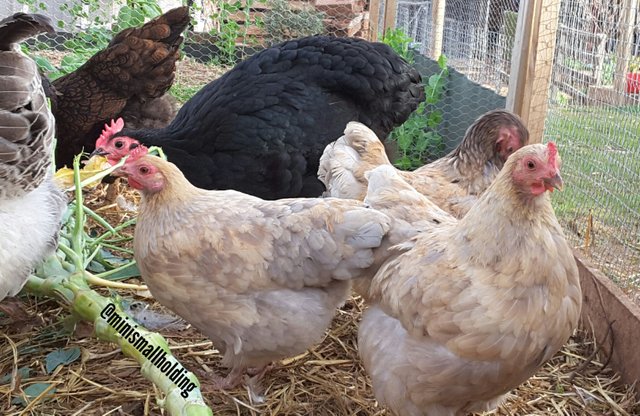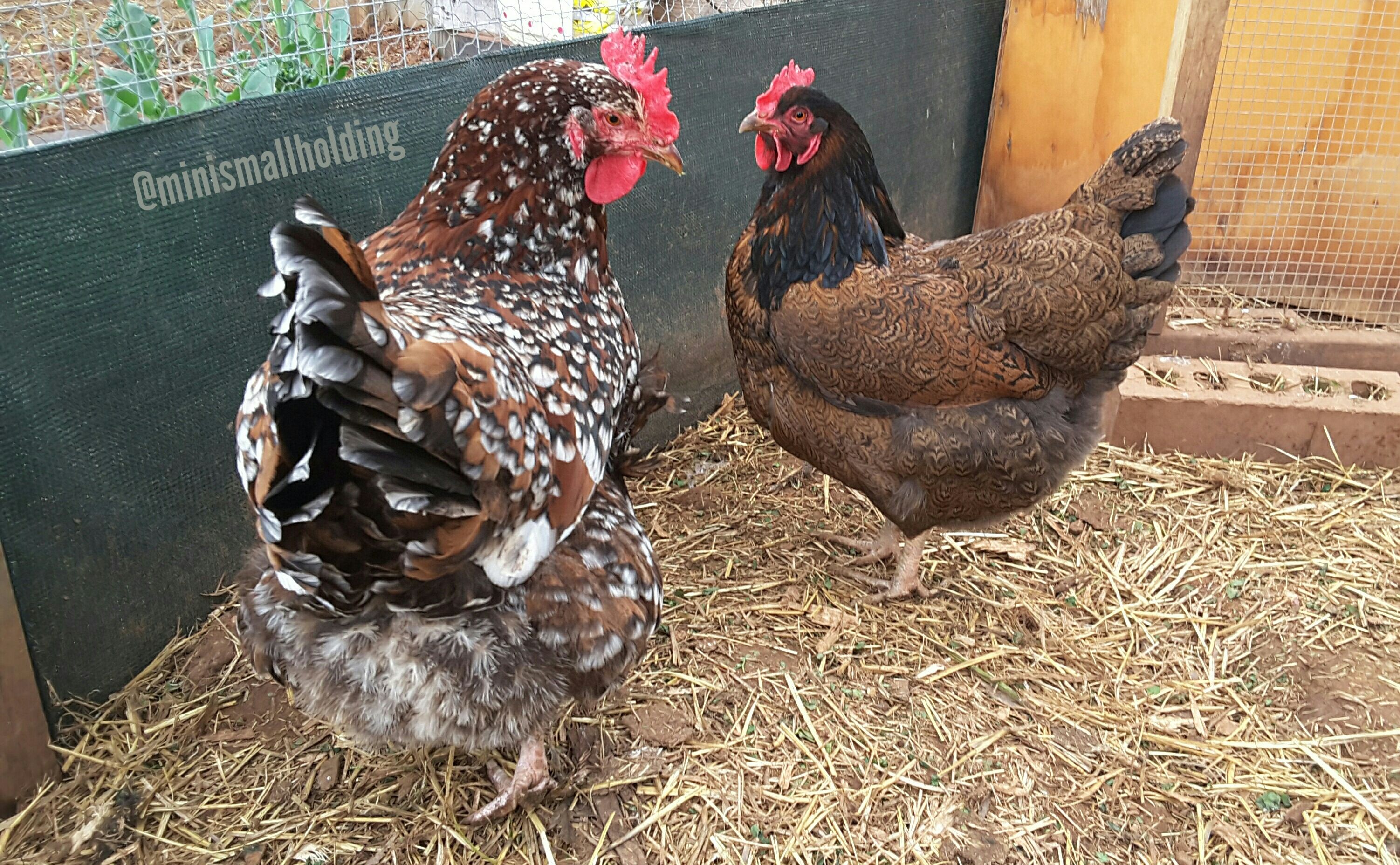Chicken Keeping Basics; for Beginners
If you're thinking of keeping chickens for the first time, then hopefully this will prepare you for that.
Chickens are flock animals, which means they are sociable birds and need companionship. So it's not a good idea to get just one chicken. It's often recommended to keep three as a minimum, because if you only have two and something happens to one of them, then the other one can pine away and literally die of loneliness.
Before they arrive you may want to have their coop ready. A coop is their home where they will sleep and shelter from the weather. It doesn't have to be fully enclosed, in fact air circulation is a must, but you may want to have it so that they can be shut in for at least a few days until they learn where their new home is. The coop will need at least one nest box per four chickens and a roost.
A nest box is a cozy, enclosed, private area where they can lay their eggs. This can be lined with something they can make a little hollow in to comfortably rest and lay. We use straw as it is fairly inexpensive, but some prefer wood shavings which are a little more costly, but are apparently less likely to be homely for chicken lice or mites and less prone to mould. You could also use purpose made nest box liners, rice hulls or shredded paper/cardboard.
A roost is a perch where chickens can get up off the floor at night to sleep. It's generally recommended that these be higher than the nest boxes to discourage them sleeping in them, as when chickens sleep, they also poop and you probably don't want them laying eggs in that! The height of the roost is not too important unless you have a heavy breed of chicken; in which case you might want to avoid setting it too high so they don't hurt themselves jumping down when they are mature adults. You'll also know it's too high of they are struggling to jump up to it.
The next decision is will you have a run or will they range the garden? Either way, you should probably consider whether predator proofing is needed. It depends where you live as to what predators you might have. Just remember that even cats and dogs find chicken a tasty meal and rats will take chicks and can even have a go at larger chickens, biting at their legs. Some wild land predators are foxes, raccoons, weasels, stoats and in some places bears. Then from the air you might have hawks or eagles. If you live in an urban area, don't assume you won't get any predators, they are there even if you don't usually see them. Foxes are renowned for getting into urban gardens and can and will jump a typical 5 foot garden fence.
When starting out it’s probably best to purchase a complete balanced feed and then as you get a better idea of what other foods you have available start to replace some of it with that. As long as you have laying hens then go for a layer feed, however growing chickens shouldn't have that as it will be too high in calcium and not high enough in protein. A grower feed would be better if you acquire young chickens.
Chickens are omnivores, so apart from chocolate they can pretty much each most of what we eat as treats. They will also forage, if they are able, eating grass, weeds, bugs and countless other little things that they spot and we never see. Two things to make sure they always have on hand are free choice shell grit or oyster shell, for laying hens, and standard grit for their digestion. Depending on the soil in your garden it may be gritty enough for them to get what they need from that, otherwise look into adding it.
Access to clean water throughout the day is essential. Laying hens in particular use a lot to form their eggs and on hot days in particular it will disappear very quickly.
One more thing to consider housing wise is access to a dust bath. A dust bath is their version of our water bath. It is important for their hygiene, helping to absorb excess oils and to keep mites and lice at bay. If they have access to the outdoors they will probably find their own places to dust bathe, but if you are restricted in space you may need to provide some sort of box with sand or dirt for them to use.
Depending on where you choose to buy hens it could be helpful to know what young ones are called as experienced people have a tendency to use those terms and forget that when we are newbies we may not have heard them before. A young female is called a pullet and a mature one at over a year old is a hen. Males you may be more familiar with as a young one is a cockerel and a mature one a cock, usually referred to as a rooster these days since we've started using that word for something else!
So enjoy your chickens, you might be surprised at what characters they are and you're bound to learn lots more as you gain experience.
Here is another post you might find useful if you're hoping to keep chickens, because unfortunately predators are a reality:
https://steemit.com/homesteading/@minismallholding/an-early-morning-visitor
You can also find us on:
Instagram: https://www.instagram.com/minismallholding/
Facebook: https://m.facebook.com/minismallholding/
YouTube: https://m.youtube.com/channel/UCBwcsmyIkW_hIEJdLUSd44g


Very good post! I have been doing lots of research before getting chickens on our homestead and from that research, I agree with what you have written. I have one thing to add that will be a help, adding DE to the dust bath will be helpful for getting rid of the mites and lice and also adding a little to their food for ingesting will also be beneficial in helping also. Upvoted and Resteemed!
Thank you. I tried to stick to the very basics with this post so as not to overwhelm. There is so much to learn about chickens and I don't think it stops once you've had them for years!
I was thinking I might do a follow up post as a kind of step on from the basics. DE would be a good one to cover in that, thank you. I sometimes forget things like that as I don't user a purpose made dust bath. Not everyone likes to use it though.
When we had a problem with lice in our new chickens (they came with them! Bummer.), we also used clean wood ash, and it cleared up the problem well! Since we're trying to be self-sustainable on our small homestead, we figured there had to be something else that could work.
Congratulations. This post is featured in today's Muxxybot Curation post.https://steemit.com/curation/@muxxybot/muxxybot-curation-32
Thank you. 😊
This post has caught the eye of @MuxxyBot and has been nominated by the curation team.
If chosen it will feature in a curation post by @MuxxyBot.
An image from your post may be featured.
Please reply to this comment if you accept or decline.
Thank you, I accept. 😊
We've had many fun times with our small flock. Chooks are definitely a must have !
I think if more people had a little flock you wouldn't need intensive egg farming.
Definitely. Just 3 provides for us and gives us a lot of extra ti share.
So nice to read through these basics again! This is my first year with chickens, and OH MAN has it been a learning summer!
As a side note, is that a Spotted Sussex in the last picture? We have a pullet, and we love her ridiculousness.
Always something to learn isn't there?
Yes, although we call them Speckled Sussex here. Hubby loves her patterning and I've grown to love her quirkiness! I was trying to get a picture of the barnevelder here, but she obviously wanted in and posed for me! 😆
A really good comprehensive introduction. It's only too easy to forget the basics when talking to new poultry keepers. You post covers them well.
Thank you. I have to admit it was easier to write it down than to tell it as you can go back and add things as you remember. When put on the spot you rarely remember everything!
Looking forward to having some of my own in the year ahead :) resteemed.
I'm sure you won't regret it! 😁
Great post about chickens! I wish that I was in a neighborhood where keeping chickens is allowed!
Thank you. Sad that you can't have chickens. Do you think you'd be allowed to keep quail? I wrote something about that a while ago if you're interested: https://steemit.com/homesteading/@minismallholding/quail-when-you-can-t-have-chickens
I'm afraid not. :-( We're in a Planned Unit Development governed by Covenants and Restrictions. We are only supposed to have 2 pets, although we have 3 cats in the house at the moment, as my son is here with his two! That's a great post about quail though!
Oh, I see.
Another common predator problem is coyotes. In my experience, coyotes were by far the most efficient and silent predators. But raccoons were the most vicious and did the most damage.
Snakes love to eat eggs, too. I once found a broody hen almost wrapped up by a rat snake trying to eat the eggs out from under her. The weirdest part was that she didn't even seem to notice it.
Errk! We've got quite a fine mesh on our runs. I can't guarantee it keeping a baby snake out, but hopefully most will stay out. I've only ever seen a Brown snake once in our garden, thankfully not breast the chicken runs. I'm grateful we don't have as many predators here as you do in the US.
Nice! I've learned a few interesting things here, and for a few minutes I've had the pleasure of owning chickens vicariously through you!
I'm glad enjoyed your vicarious chicken owning experience! 😄